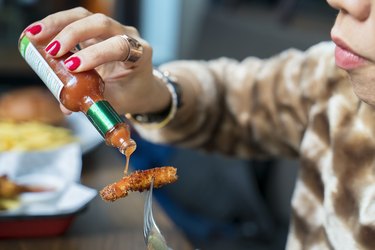
Even if you can down curry vindaloo or burritos doused in hot sauce without flinching, your body might not be able to hold its poker face as well. While most people can eat spicy foods with no problems, others find they provoke diarrhea and other uncomfortable digestive symptoms.
Read more: Can Spicy Foods or Caffeine Cause Gastritis?
Video of the Day
Video of the Day
The Side Effects of Capsaicin
Spicy foods containing hot peppers cause a burning sensation in your mouth, skin and eyes — as you know if you've ever accidentally touched your eyes after chopping jalapeños — because they contain the chemical compound capsaicin. Capsaicin activates a pain receptor that sends signals to the brain that we perceive as hot burning pain, according to a June 2016 article in the journal Molecules.
These receptors also exist in the stomach and intestines, so food containing capsaicin causes some irritation to the gastrointestinal tract as it is digested. Some studies suggest that diarrhea after eating spicy foods is due to the fact that "capsaicin may increase intestinal motility" — or the speed at which food moves through the gastrointestinal tract, says Lindsey Albenberg, DO, spokesperson of the American Gastroenterological Association and an attending physician in the Division of Pediatric Gastroenterology, Hepatology and Nutrition at the Children's Hospital of Philadelphia.
People sensitive to spicy foods may also experience abdominal discomfort and increased gas and bloating. Capsaicin also can irritate the anus as it exits the body, which is why some people have painful bowel movements and even the sensation of burning poop after eating spicy foods.
IBS May Lead to Extra Sensitivity to Spicy Foods
"It's not well-understood why some people have trouble digesting spicy foods, but it could have something to do with varying degrees of sensitivity of the nerves within the gastrointestinal tract," says Dr. Albenberg. "People who have irritable bowel syndrome (IBS) or inflammatory bowel disease (IBD) may be more sensitive."
Indeed, there's some research to confirm that people with IBS seem to be especially sensitive to capsaicin, according to a January 2009 study in Neurogastroenterology and Motility. And an October 2013 study published in the World Journal of Gastroenterology found an association between frequently eating spicy foods and IBS, especially among women.
On the other hand, some small studies have suggested that frequently eating spicy foods may lead to desensitization in IBS patients, according to November 2011 research in Digestive Diseases and Sciences and a July 2014 study in the Journal of Neurogastroenterology and Motility.
Read more: Stomach Pain After Eating Spicy Food
Although diarrhea induced by spicy foods is unpleasant and uncomfortable, there's little evidence to suggest it causes long-term damage to your digestive system.
Soothing Tactics for After Eating Spicy Foods
If you are susceptible to diarrhea and painful bowel movements after eating spicy foods, the easiest prevention is to avoid them altogether.
If you're already dealing with the aftermath of a spicy meal, you can soothe the pain from burning diarrhea by taking a warm bath with Epsom salt or applying over-the-counter hemorrhoid creams. And, as always, when you're experiencing diarrhea, make sure you are drinking enough water to replace the fluids you lost.
Eating dairy or other foods high in fat can help cut the burn you feel in your mouth after eating spicy foods. That's because capsaicin dissolves in fat. (Drinking water, in contrast, will just make matters worse by spreading the capsaicin around your mouth.) However, that strategy may be counter-productive when it comes to alleviating diarrhea since high-fat foods can worsen diarrhea in some people. It may take some trial and error to figure out what food combinations work best for you.
Read more: Foods to Eat to Stop Diarrhea
If your spicy-food-induced diarrhea is a symptom of IBS, you may find your symptoms of the condition are improved through dietary changes like increasing fiber, avoiding gluten and trying a low-FODMAP diet.
If your diarrhea doesn't go away after avoiding spicy foods, you may have an underlying condition that requires medical attention. You should see a doctor if your diarrhea persists beyond a few days, is accompanied by severe abdominal or rectal pain, bloody or black stools, a high fever or dehydration, according to the Mayo Clinic.
- Neurogastroenterology and Motility: "Effects of chili on postprandial gastrointestinal symptoms in diarrhoea predominant irritable bowel syndrome: evidence for capsaicin‐sensitive visceral nociception hypersensitivity"
- JAMA: "Spicy Food and the Stomach. Evaluation by Videoendoscopy"
- Molecules: "Capsaicin, Nociception and Pain"
- Digestive Diseases and Sciences: "Effect of Red Pepper on Symptoms of Irritable Bowel Syndrome: Preliminary Study"
- Neurogastroenterology and Motility: "Effects of Chili Treatment on Gastrointestinal and Rectal Sensation in Diarrhea-predominant Irritable Bowel Syndrome: A Randomized, Double-blinded, Crossover Study"
- National Institute of Diabetes and Digestive and Kidney Diseases: "Eating, Diet, & Nutrition for Irritable Bowel Syndrome"
- World Journal of Gastroenterology: "Consumption of Spicy Foods and the Prevalence of Irritable Bowel Syndrome"
- Mayo Clinic: "Diarrhea"
- National Digestive Diseases Information Clearinghouse: What I Need to Know About IBS
- NDDIC: What I Need to Know About Peptic Ulcers
- Mayo Clinic: Diarrhea: Prevention
Is this an emergency? If you are experiencing serious medical symptoms, please see the National Library of Medicine’s list of signs you need emergency medical attention or call 911.